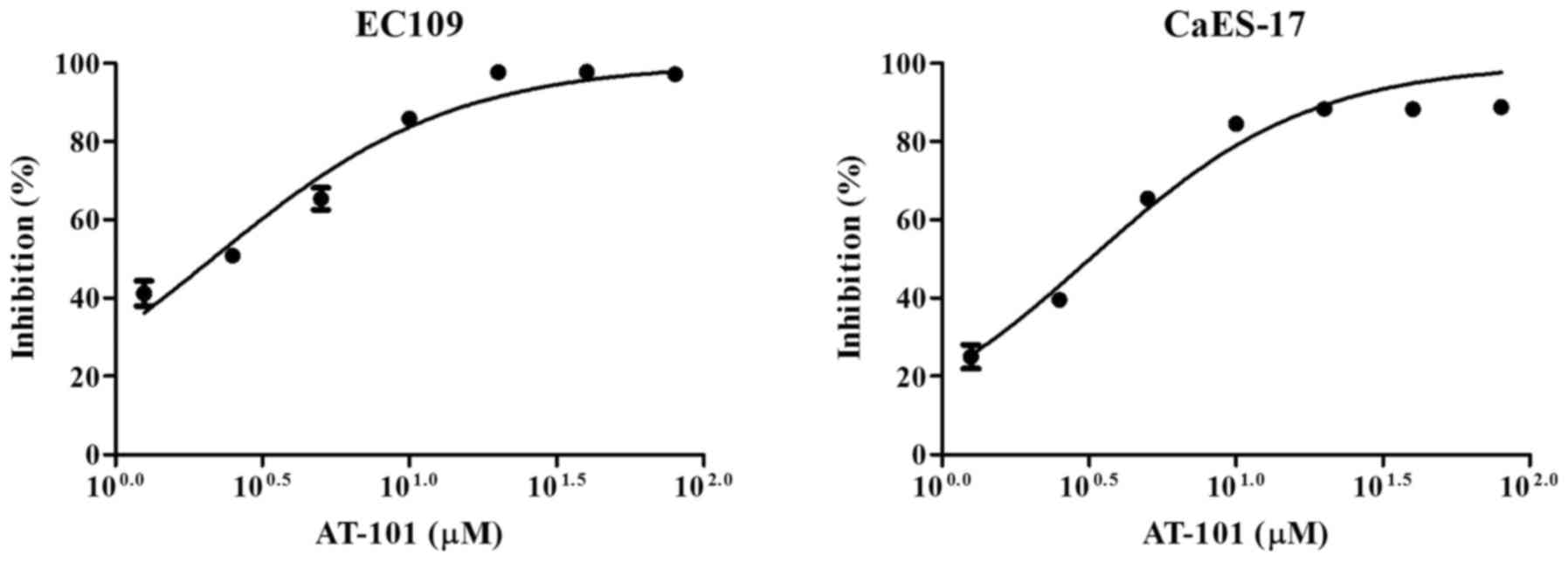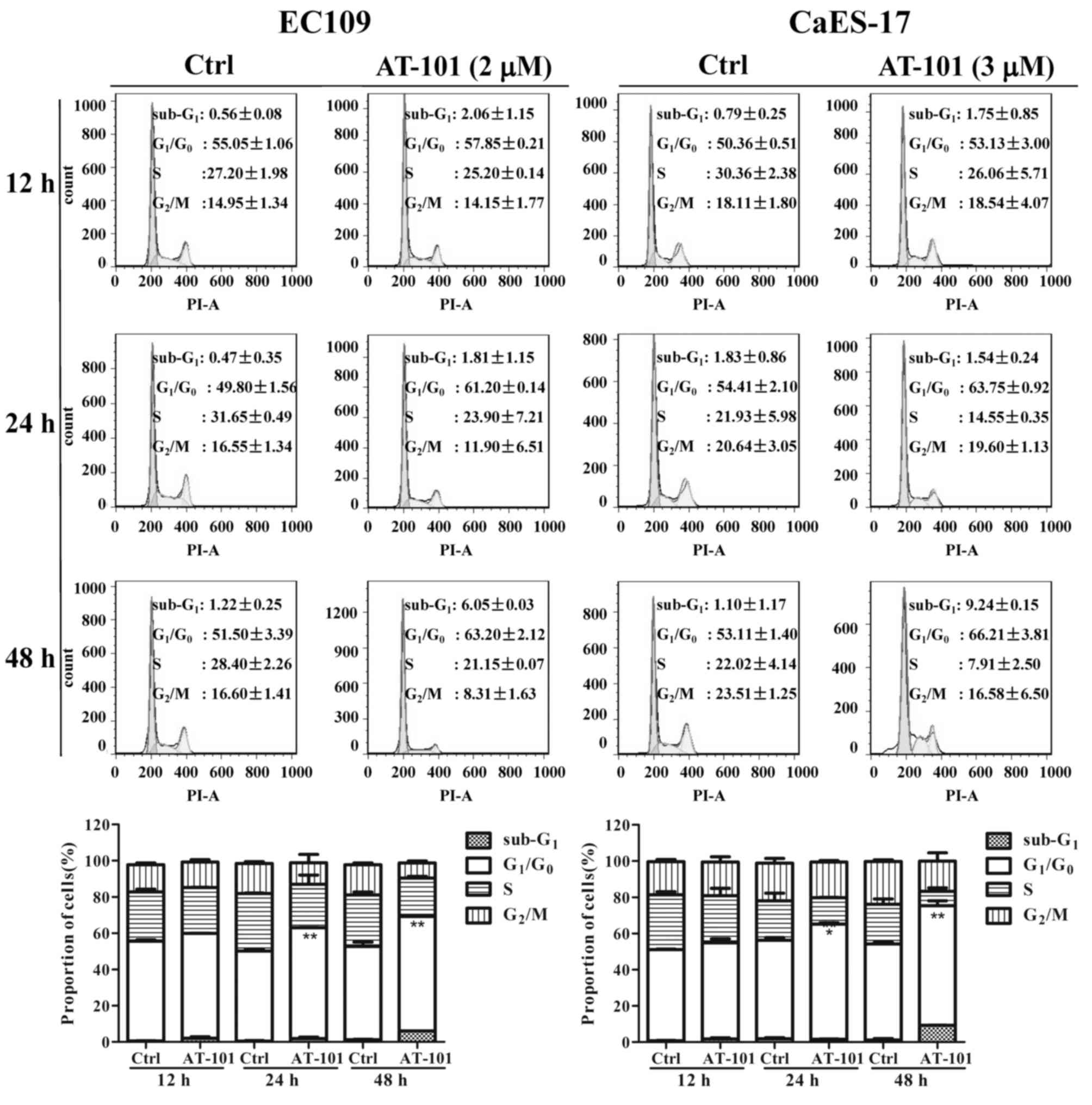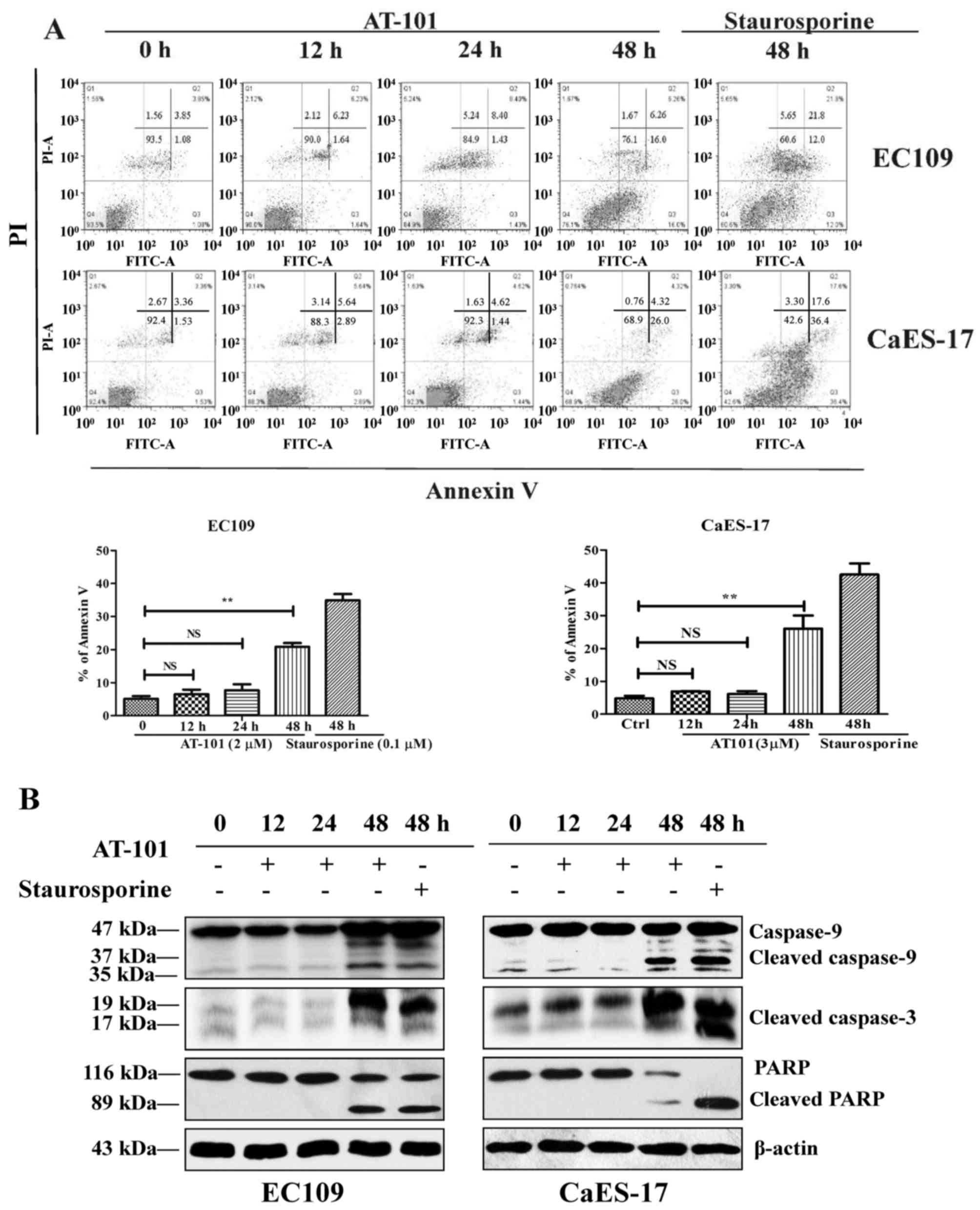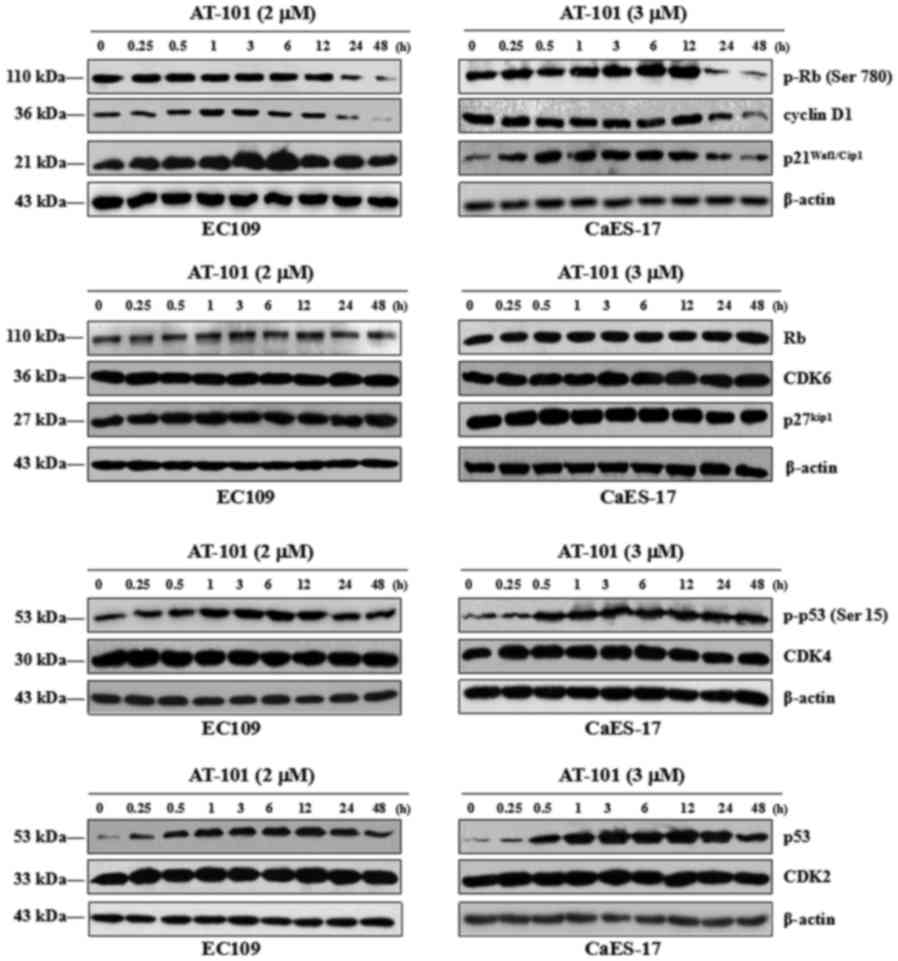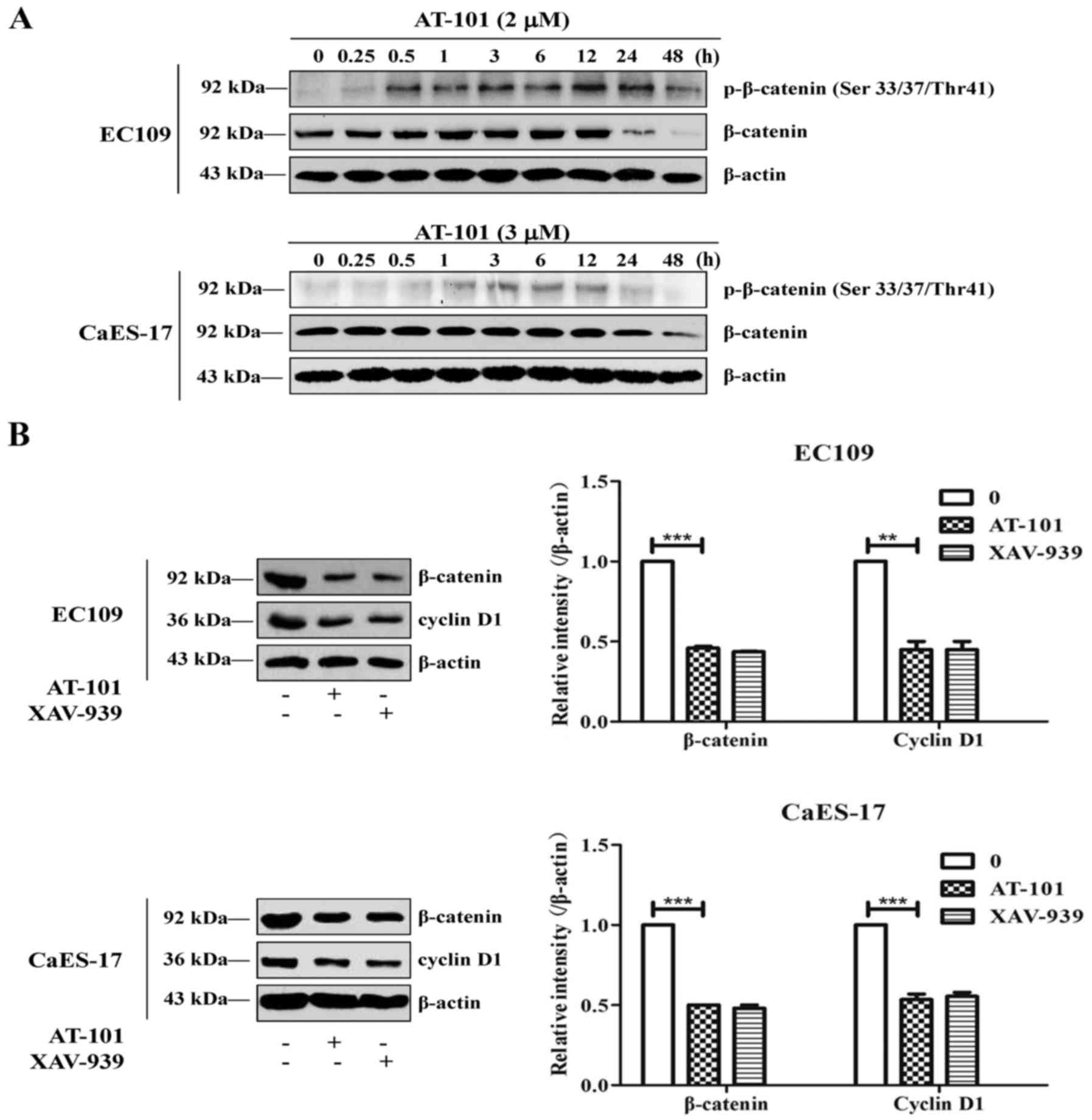|
1
|
Herszenyi L and Tulassay Z: Epidemiology
of gastrointestinal and liver tumors. Eur Rev Med Pharmacol Sci.
14:249–258. 2010.PubMed/NCBI
|
|
2
|
Torre LA, Bray F, Siegel RL, Ferlay J,
Lortet-Tieulent J and Jemal A: Global cancer statistics, 2012. CA
Cancer J Clin. 65:87–108. 2015. View Article : Google Scholar : PubMed/NCBI
|
|
3
|
Hanahan D and Weinberg RA: Hallmarks of
cancer: The next generation. Cell. 144:646–674. 2011. View Article : Google Scholar : PubMed/NCBI
|
|
4
|
Shamas-Din A, Brahmbhatt H, Leber B and
Andrews DW: BH3-only proteins: Orchestrators of apoptosis. Biochim
Biophys Acta. 1813:508–520. 2011. View Article : Google Scholar : PubMed/NCBI
|
|
5
|
Davids MS and Letai A: Targeting the
B-cell lymphoma/leukemia 2 family in cancer. J Clin Oncol.
30:3127–3135. 2012. View Article : Google Scholar : PubMed/NCBI
|
|
6
|
Azmi S, Dinda AK, Chopra P, Chattopadhyay
TK and Singh N: Bcl-2 expression is correlated with low apoptotic
index and associated with histopathological grading in esophageal
squamous cell carcinomas. Tumour Biol. 21:3–10. 2000. View Article : Google Scholar : PubMed/NCBI
|
|
7
|
Kang SY, Han JH, Lee KJ, Choi JH, Park JI,
Kim HI, Lee HW, Jang JH, Park JS, Kim HC, et al: Low expression of
Bax predicts poor prognosis in patients with locally advanced
esophageal cancer treated with definitive chemoradiotherapy. Clin
Cancer Res. 13:4146–4153. 2007. View Article : Google Scholar : PubMed/NCBI
|
|
8
|
Wei W, Wang Y, Yu X, Ye L, Jiang Y and
Cheng Y: Expression of TP53BCL-2, and VEGFA genes in
esophagus carcinoma and its biological significance. Med Sci Monit.
21:3016–3022. 2015. View Article : Google Scholar : PubMed/NCBI
|
|
9
|
Adams R, Geissman TA and Edwards JD:
Gossypol, a pigment of cottonseed. Chem Rev. 60:555–574. 1960.
View Article : Google Scholar : PubMed/NCBI
|
|
10
|
Meng Y, Tang W, Dai Y, Wu X, Liu M, Ji Q,
Ji M, Pienta K, Lawrence T and Xu L: Natural BH3 mimetic
(−)-gossypol chemosensitizes human prostate cancer via Bcl-xL
inhibition accompanied by increase of Puma and Noxa. Mol Cancer
Ther. 7:2192–2202. 2008. View Article : Google Scholar : PubMed/NCBI
|
|
11
|
Van Poznak C, Seidman AD, Reidenberg MM,
Moasser MM, Sklarin N, Van Zee K, Borgen P, Gollub M, Bacotti D,
Yao TJ, et al: Oral gossypol in the treatment of patients with
refractory metastatic breast cancer: A phase I/II clinical trial.
Breast Cancer Res Treat. 66:239–248. 2001. View Article : Google Scholar : PubMed/NCBI
|
|
12
|
Jiang J, Sugimoto Y, Liu S, Chang HL, Park
KY, Kulp SK and Lin YC: The inhibitory effects of gossypol on human
prostate cancer cells-PC3 are associated with transforming growth
factor beta1 (TGFbeta1) signal transduction pathway. Anticancer
Res. 24:91–100. 2004.PubMed/NCBI
|
|
13
|
Kline MP, Rajkumar SV, Timm MM, Kimlinger
TK, Haug JL, Lust JA, Greipp PR and Kumar S: R-(−)-gossypol
(AT-101) activates programmed cell death in multiple myeloma cells.
Exp Hematol. 36:568–576. 2008. View Article : Google Scholar : PubMed/NCBI
|
|
14
|
Ko CH, Shen SC, Yang LY, Lin CW and Chen
YC: Gossypol reduction of tumor growth through ROS-dependent
mitochondria pathway in human colorectal carcinoma cells. Int J
Cancer. 121:1670–1679. 2007. View Article : Google Scholar : PubMed/NCBI
|
|
15
|
Wolter KG, Wang SJ, Henson BS, Wang S,
Griffith KA, Kumar B, Chen J, Carey TE, Bradford CR and D Silva NJ:
(−)-gossypol inhibits growth and promotes apoptosis of human head
and neck squamous cell carcinoma in vivo. Neoplasia. 8:163–172.
2006. View Article : Google Scholar : PubMed/NCBI
|
|
16
|
Mohammad RM, Wang S, Aboukameel A, Chen B,
Wu X, Chen J and Al-Katib A: Preclinical studies of a nonpeptidic
small-molecule inhibitor of Bcl-2 and Bcl-XL
[(−)-gossypol] against diffuse large cell lymphoma. Mol Cancer
Ther. 4:13–21. 2005. View Article : Google Scholar : PubMed/NCBI
|
|
17
|
Schelman WR, Mohammed TA, Traynor AM,
Kolesar JM, Marnocha RM, Eickhoff J, Keppen M, Alberti DB, Wilding
G, Takebe N, et al: A phase I study of AT-101 with cisplatin and
etoposide in patients with advanced solid tumors with an expanded
cohort in extensive-stage small cell lung cancer. Invest New Drugs.
32:295–302. 2014. View Article : Google Scholar : PubMed/NCBI
|
|
18
|
Zhong D, Gu C, Shi L, Xun T, Li X, Liu S
and Yu L: Obatoclax induces G1/G0-phase arrest via
p38/p21waf1/Cip1 signaling pathway in human esophageal
cancer cells. J Cell Biochem. 115:1624–1635. 2014. View Article : Google Scholar : PubMed/NCBI
|
|
19
|
Konopleva M, Watt J, Contractor R, Tsao T,
Harris D, Estrov Z, Bornmann W, Kantarjian H, Viallet J, Samudio I
and Andreeff M: Mechanisms of antileukemic activity of the novel
Bcl-2 homology domain-3 mimetic GX15-070 (obatoclax). Cancer Res.
68:3413–3420. 2008. View Article : Google Scholar : PubMed/NCBI
|
|
20
|
Yu L, Wu WK, Gu C, Zhong D, Zhao X, Kong
Y, Lin Q, Chan MT, Zhou Z and Liu S: Obatoclax impairs lysosomal
function to block autophagy in cisplatin-sensitive and -resistant
esophageal cancer cells. Oncotarget. 7:14693–14707. 2016.PubMed/NCBI
|
|
21
|
Malik SA, Orhon I, Morselli E, Criollo A,
Shen S, Mariño G, BenYounes A, Bénit P, Rustin P, Maiuri MC, et al:
BH3 mimetics activate multiple pro-autophagic pathways. Oncogene.
30:3918–3929. 2011. View Article : Google Scholar : PubMed/NCBI
|
|
22
|
Maiuri MC, Criollo A, Tasdemir E, Vicencio
JM, Tajeddine N, Hickman JA, Geneste O and Kroemer G: BH3-only
proteins and BH3 mimetics induce autophagy by competitively
disrupting the interaction between Beclin 1 and
Bcl-2/Bcl-XL. Autophagy. 3:374–376. 2007. View Article : Google Scholar : PubMed/NCBI
|
|
23
|
Chen Q, Song S, Wei S, Liu B, Honjo S,
Scott A, Jin J, Ma L, Zhu H, Skinner HD, et al: ABT-263 induces
apoptosis and synergizes with chemotherapy by targeting stemness
pathways in esophageal cancer. Oncotarget. 6:25883–25896.
2015.PubMed/NCBI
|
|
24
|
Wang J, Peng Y, Liu Y, Yang J, Huang M and
Tan W: AT-101 inhibits hedgehog pathway activity and cancer growth.
Cancer Chemother Pharmacol. 76:461–469. 2015. View Article : Google Scholar : PubMed/NCBI
|
|
25
|
Lian J, Wu X, He F, Karnak D, Tang W, Meng
Y, Xiang D, Ji M, Lawrence TS and Xu L: A natural BH3 mimetic
induces autophagy in apoptosis-resistant prostate cancer via
modulating Bcl-2-Beclin1 interaction at endoplasmic reticulum. Cell
Death Differ. 18:60–71. 2011. View Article : Google Scholar : PubMed/NCBI
|
|
26
|
Hou DX, Uto T, Tong X, Takeshita T,
Tanigawa S, Imamura I, Ose T and Fujii M: Involvement of reactive
oxygen species-independent mitochondrial pathway in
gossypol-induced apoptosis. Arch Biochem Biophys. 428:179–187.
2004. View Article : Google Scholar : PubMed/NCBI
|
|
27
|
Moon DO, Kim MO, Lee JD and Kim GY:
Gossypol suppresses NF-kappaB activity and NF-kappaB-related gene
expression in human leukemia U937 cells. Cancer letters.
264:192–200. 2008. View Article : Google Scholar : PubMed/NCBI
|
|
28
|
Pietenpol JA and Stewart ZA: Cell cycle
checkpoint signaling: Cell cycle arrest versus apoptosis.
Toxicology. 181–182. 475–481. 2002.PubMed/NCBI
|
|
29
|
Giacinti C and Giordano A: RB and cell
cycle progression. Oncogene. 25:5220–5227. 2006. View Article : Google Scholar : PubMed/NCBI
|
|
30
|
Munoz-Alonso MJ, Acosta JC, Richard C,
Delgado MD, Sedivy J and Leon J: p21Cip1 and p27Kip1 induce
distinct cell cycle effects and differentiation programs in myeloid
leukemia cells. J Biol Chem. 280:18120–18129. 2005. View Article : Google Scholar : PubMed/NCBI
|
|
31
|
Vermeulen K, Van Bockstaele DR and
Berneman ZN: The cell cycle: A review of regulation, deregulation
and therapeutic targets in cancer. Cell Prolif. 36:131–149. 2003.
View Article : Google Scholar : PubMed/NCBI
|
|
32
|
Tibbetts RS, Brumbaugh KM, Williams JM,
Sarkaria JN, Cliby WA, Shieh SY, Taya Y, Prives C and Abraham RT: A
role for ATR in the DNA damage-induced phosphorylation of p53.
Genes Dev. 13:152–157. 1999. View Article : Google Scholar : PubMed/NCBI
|
|
33
|
Benson EK, Mungamuri SK, Attie O,
Kracikova M, Sachidanandam R, Manfredi JJ and Aaronson SA:
p53-dependent gene repression through p21 is mediated by
recruitment of E2F4 repression complexes. Oncogene. 33:3959–3969.
2014. View Article : Google Scholar : PubMed/NCBI
|
|
34
|
Shtutman M, Zhurinsky J, Simcha I,
Albanese C, D'Amico M, Pestell R and Ben-Ze'ev A: The cyclin D1
gene is a target of the beta-catenin/LEF-1 pathway. Proc Natl Acad
Sci USA. 96:5522–5527. 1999. View Article : Google Scholar : PubMed/NCBI
|















